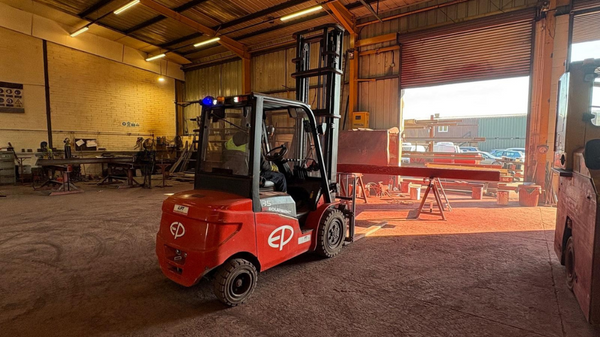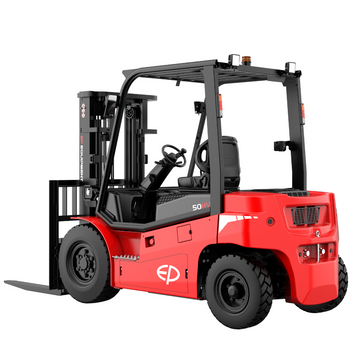In today's rapidly evolving logistics landscape, warehousing operations face unprecedented pressure. From stringent environmental regulations and rising energy costs to the imperative of maximizing operational efficiency, the demands on warehousing managers, logistics professionals, and operations directors are more complex than ever. Central to meeting these challenges is the strategic adoption of sustainable practices, particularly within material handling. While much attention has rightly focused on warehouse infrastructure like LED lighting and solar panels, the equipment that moves goods daily – forklifts – presents one of the most significant opportunities for a greener, more efficient future.
For decades, internal combustion (IC) forklifts, powered by propane or diesel, and traditional lead-acid battery electric models dominated warehouses. However, a revolutionary technology is now rapidly gaining traction: lithium-ion (Li-ion) battery-powered forklifts. More than just an incremental upgrade, lithium-ion technology offers a holistic solution that directly addresses critical sustainability goals while simultaneously boosting productivity and significantly improving the bottom line. It’s time for modern warehouses to consider making the switch.

The Environmental Imperative: A Breath of Fresh Air for Your Warehouse
The drive towards sustainability is no longer optional; it's a fundamental business requirement. Li-ion forklifts are at the forefront of this shift, delivering compelling environmental benefits:
1. Drastically Reduced Emissions
Perhaps the most immediate and impactful environmental benefit of lithium-ion forklifts is their zero tailpipe emissions. Unlike their IC counterparts, which continuously release harmful pollutants like carbon dioxide (CO2), nitrogen oxides (NOx), and particulate matter, electric lithium-ion forklifts produce no direct emissions during operation. This is critical for improving indoor air quality for your workforce and reducing your facility's overall carbon footprint.
To put this into perspective, a single diesel forklift can emit approximately 36 tonnes of CO2 over a five-year period. While electricity generation still produces emissions, the move to electric forklifts allows warehouses to leverage increasingly renewable energy sources (solar, wind) for charging, further lowering their indirect carbon impact. The entire lifecycle carbon footprint of a lithium-ion forklift is demonstrably lower than that of an IC model, aligning your operations with global efforts to combat climate change.
2. Superior Energy Efficiency
Compared to traditional lead-acid batteries, lithium-ion technology offers significantly higher energy efficiency, typically ranging from 30% to 50% greater. This means less energy is wasted during charging and operation. Lead-acid batteries lose a considerable amount of energy as heat during charging and discharge, requiring more electricity to achieve the same work output. Lithium-ion batteries, with their lower internal resistance and more efficient chemistry, convert more of the stored electrical energy into usable power.
This translates directly into lower energy consumption and, consequently, reduced electricity bills for your warehouse. As energy prices continue to fluctuate and trend upwards, every percentage point of efficiency gained contributes to substantial long-term savings and a smaller energy footprint.
3. Significant Waste Reduction
The environmental benefits of lithium-ion extend to waste management. Li-ion batteries boast a considerably longer lifespan than lead-acid batteries – often two to four times longer, with typical lifespans of 2,000 to 3,000 charge cycles compared to 1,000-1,500 for lead-acid. This extended lifespan means fewer battery replacements over the lifetime of a forklift, reducing the demand for new materials and manufacturing processes.
Furthermore, lithium-ion technology eliminates the disposal of hazardous lead-acid batteries. Lead-acid batteries contain lead and sulfuric acid, both highly toxic substances that pose serious environmental risks if not handled and recycled correctly. Improper disposal can lead to soil and water contamination. While lead-acid batteries are recyclable, their inherent hazardous nature requires careful, costly, and regulated disposal processes. Lithium-ion batteries, while also requiring responsible recycling at the end of their very long life, do not contain these same highly toxic components, simplifying the waste stream and reducing environmental risk.
4. Quieter Operations
While often overlooked in environmental discussions, noise reduction is a tangible benefit. Lithium-ion forklifts operate significantly quieter than their diesel or propane counterparts. This not only contributes to less noise pollution in the immediate environment but also creates a more pleasant and safer working atmosphere for your employees, reducing auditory fatigue and improving communication.
Operational Excellence: Driving Efficiency Hand-in-Hand with Sustainability
The sustainable advantages of lithium-ion forklifts are powerfully amplified by their direct contributions to operational efficiency. For warehousing managers and operations directors, these benefits translate into tangible improvements in productivity and cost savings.
1. Unmatched Uptime and Productivity
Lithium-ion batteries fundamentally redefine forklift uptime. They offer:
-
Faster Charging: A full charge can be achieved in as little as 1 to 4 hours, a stark contrast to the 8 hours often required for lead-acid batteries.
-
Opportunity Charging: Li-ion batteries can be "opportunity charged" during short breaks or shift changes without any detrimental effect on their lifespan or performance. This eliminates the need for full discharge/recharge cycles and dedicated battery cool-down periods.
-
No Battery Swapping: The combined benefits of fast charging and opportunity charging mean that most operations can eliminate cumbersome and time-consuming battery swaps entirely. This not only saves valuable labour time but also reduces the risk of injury associated with heavy battery handling.
The result is substantially increased uptime and productivity. Forklifts spend less time idle and more time moving goods, leading to a more efficient use of your resources and a smoother workflow. Consistent power output, regardless of charge level, further ensures peak performance throughout the entire shift.
2. Dramatically Lower Maintenance Needs
Compared to both IC engines and lead-acid batteries, lithium-ion systems require significantly reduced maintenance.
-
For IC Forklifts: The absence of internal combustion engines eliminates the need for oil changes, spark plug replacements, air filter changes, and fuel system maintenance. This dramatically cuts down on parts, labour, and associated waste.
-
For Lead-Acid Batteries: Lithium-ion batteries require no watering, cleaning, or equalisation charges. The Battery Management System (BMS) intelligently handles charging and discharge, optimising battery health. This saves considerable time, labour, and eliminates the mess and safety risks associated with lead-acid battery upkeep.
Lower maintenance directly contributes to operational efficiency by reducing downtime for servicing and freeing up your maintenance team for other critical tasks.
3. Optimised Space Utilisation
The elimination of dedicated battery charging rooms – a necessity for lead-acid fleets due to ventilation requirements and acid spill risks – is a major space optimisation benefit. With lithium-ion batteries, forklifts can be charged wherever power outlets are available, even on the warehouse floor during breaks. This frees up valuable square footage that can be repurposed for additional storage, new production lines, or more efficient workflow areas, directly contributing to your warehouse's overall capacity and profitability.
4. Enhanced Safety Environment
Safety is paramount in any warehouse. Lithium-ion forklifts offer several improved safety features:
-
No Hazardous Emissions: The absence of toxic fumes, hydrogen gas build-up, and acid spills (common with lead-acid) significantly reduces health and safety risks for operators and other personnel.
-
Integrated BMS: Advanced Battery Management Systems prevent issues like overcharging, over-discharging, and overheating, mitigating potential hazards.
-
Reduced Handling: Eliminating battery swaps lowers the risk of strain injuries or accidents associated with moving heavy batteries.
These safety enhancements contribute to a healthier work environment, potentially reducing insurance claims and boosting employee morale.

The Return on Investment (ROI) and Long-Term Value
While the upfront cost of lithium-ion forklifts and their batteries is typically higher than that of traditional alternatives, this initial investment is quickly offset by substantial long-term savings and increased productivity, leading to a compelling Return on Investment (ROI).
Consider these factors:
-
Lower Energy Bills: The superior energy efficiency of lithium-ion batteries translates directly into reduced electricity consumption, delivering measurable savings on your utility bills.
-
Reduced Maintenance Costs: Significantly lower maintenance requirements mean less spent on parts, consumables, and labour, often leading to thousands of pounds in savings annually per truck.
-
Increased Productivity: Higher uptime, faster turnaround times due to opportunity charging, and the elimination of battery swaps directly translate to more goods moved and more efficient use of your labour force, boosting overall productivity and revenue potential.
-
Extended Lifespan: The longer operational life of lithium-ion batteries and the forklifts designed to use them means a lower total cost of ownership over the equipment's lifespan, deferring replacement costs.
Many businesses report a payback period of under three years when making the switch to lithium-ion, making it a sound financial decision. Furthermore, the UK government offers attractive incentives for businesses adopting green technologies. Notably, Full Expensing allows businesses to deduct 100% of the cost of new and unused "plant and machinery" (including forklifts) from their taxable profits in the year of purchase. This significantly reduces your tax liability and effectively lowers the net cost of your investment. Additionally, the Workplace Charging Scheme provides grants for installing electric vehicle charge points, which can be applicable to forklift charging infrastructure.
Framing the switch to lithium-ion forklifts as an investment, not merely an expense, positions your business for a more sustainable, efficient, and ultimately, more profitable future.
Seamless Integration: Implementation Considerations
Transitioning to a lithium-ion forklift fleet is a strategic move that requires thoughtful planning, though the process is generally straightforward.
-
Charging Infrastructure: While lithium-ion offers charging flexibility, a robust electrical infrastructure is still crucial. Assess your existing power supply and consider the optimal placement of charging points to maximise opportunity charging while minimising cable runs. Your chosen supplier can provide expert guidance on this.
-
Operator Training: While lithium-ion forklifts are often easier to operate and maintain, ensuring your team is fully trained on their safe operation, charging protocols, and basic daily checks is essential. Adherence to UK Health and Safety Executive (HSE) guidelines, including the Provision and Use of Work Equipment Regulations (PUWER) and Lifting Operations and Lifting Equipment Regulations (LOLER), remains paramount.
-
Choosing a Reputable Supplier: Select a supplier with a proven track record in lithium-ion technology, offering high-quality products, comprehensive after-sales support, robust warranties, and a deep understanding of your operational needs. A reliable partner will ensure a smooth transition and long-term success.
Paving the Way for Future-Ready Warehouses
The shift to lithium-ion forklifts is more than just an equipment upgrade; it's a strategic move that fundamentally aligns your warehousing operations with the twin pillars of modern business: sustainability and efficiency. By embracing lithium-ion, you dramatically reduce your environmental footprint through lower emissions, enhanced energy efficiency, and significant waste reduction. Simultaneously, you unlock unparalleled operational advantages, including increased uptime, lower maintenance costs, optimised space utilisation, and improved safety.
In a world increasingly demanding responsible and efficient business practices, lithium-ion forklifts offer a powerful competitive edge. They represent an investment in a greener planet, a more productive workforce, and a more resilient, future-ready warehouse.
It's time to stop thinking of forklifts as mere machines and start seeing them as catalysts for change. The future of material handling is electric, sustainable, and powered by lithium-ion. Is your warehouse ready to make the switch?










